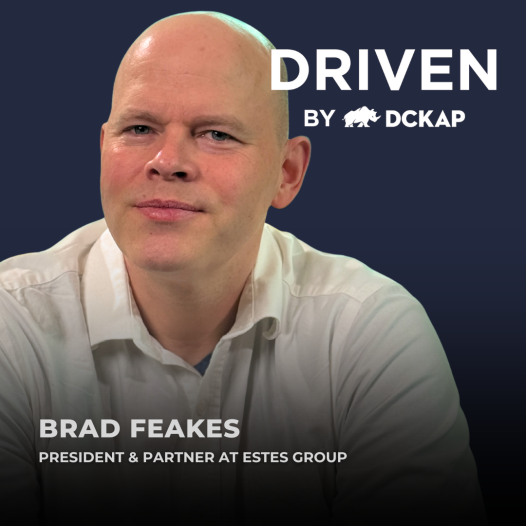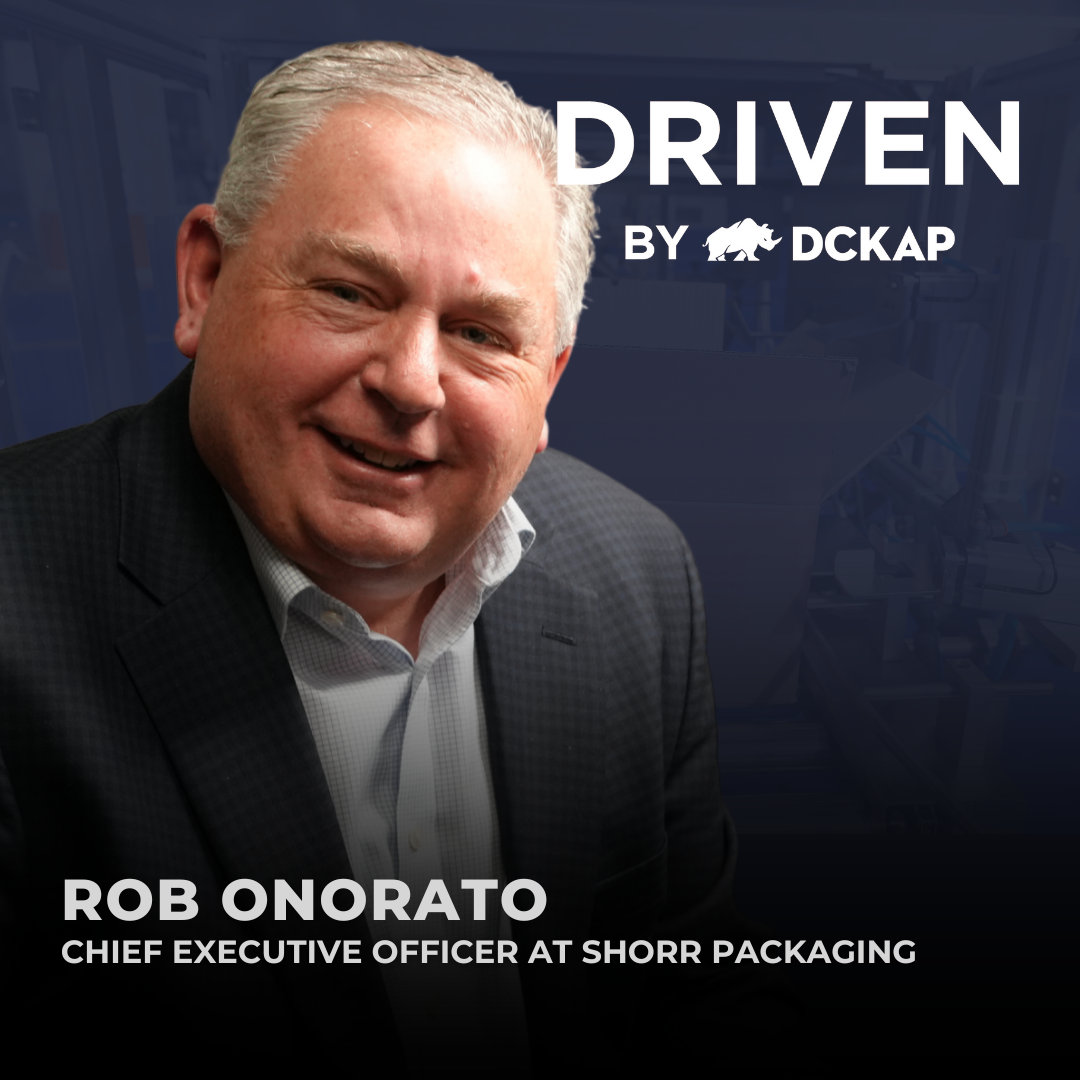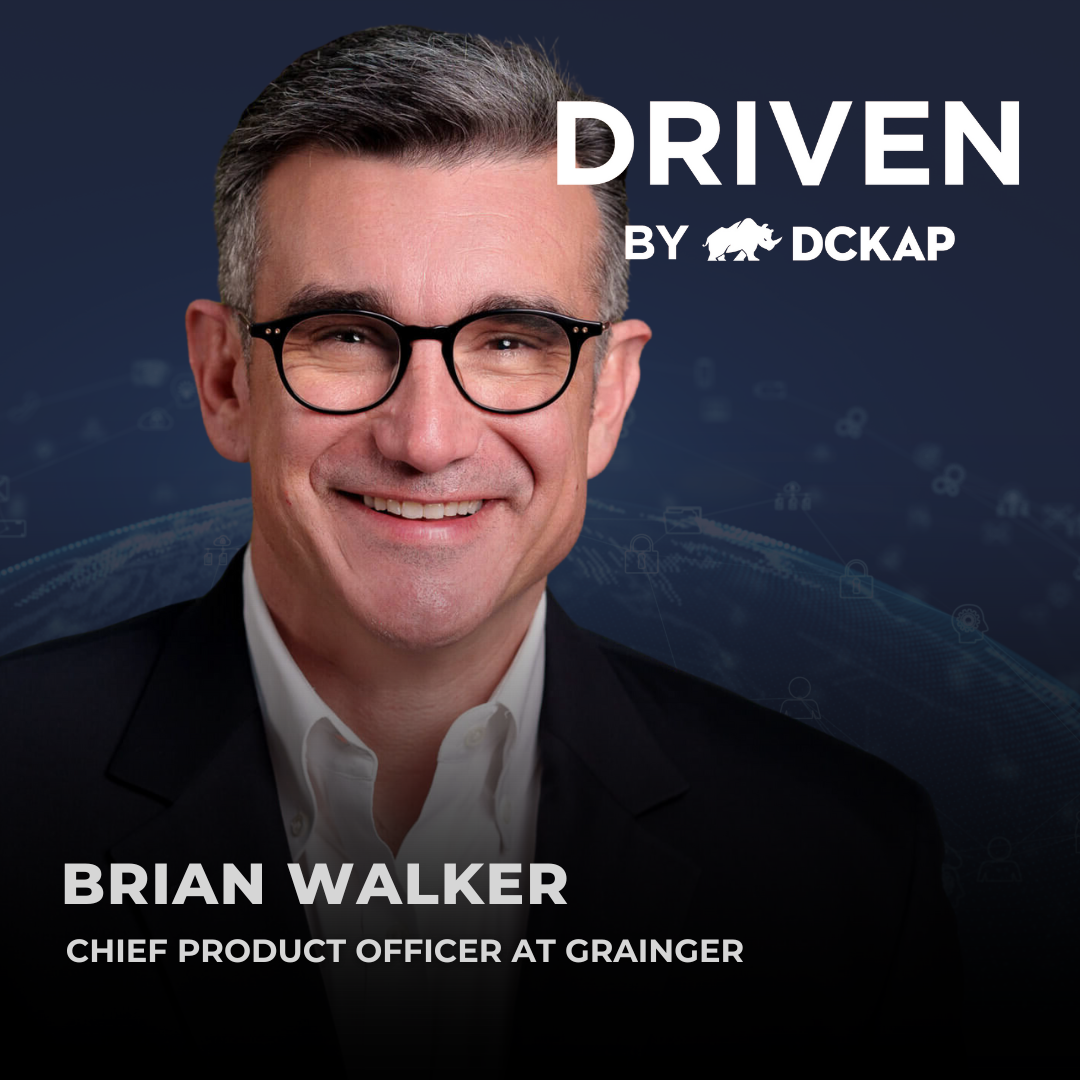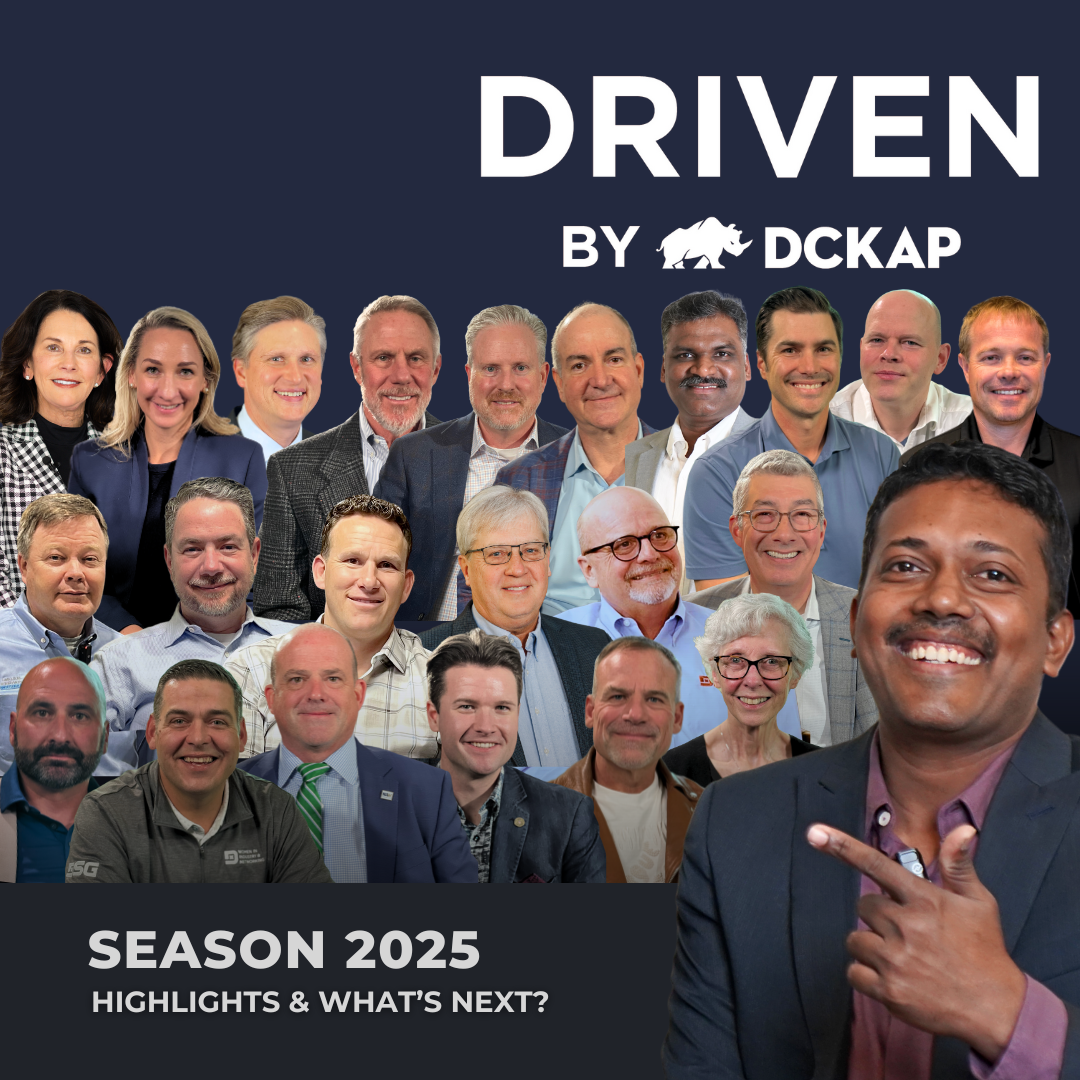Estes Group is a leading provider of ERP consulting, IT, and cloud managed services based in Loveland, Colorado and, with two decades in the industry, Brad brings his practical, no-nonsense advice for businesses navigating digital transformation. Tune in to discover why AI needs a body, not just a brain, and how to build a smart integration strategy that actually delivers results!
OR LISTEN ON:
Karthik Chidambaram: Hello everyone. Welcome to a new episode of The Driven
by DCKAP Podcast. Brad Feakes is the President and Partner at Estes Group.
Estes is based in Loveland, Colorado, a leading provider of ERP, consulting
IT and Cloud managed services.
Brad, welcome to the show.
Brad Feakes: Thanks, Karthik. Great to be here.
Karthik Chidambaram: So Brad, thank you so much for joining me today. Tell
us about the Estes Group.
Brad Feakes: Well, Estes, we've been around for about 20 years. We started
off as primarily a consultancy focused on implementing ERP systems. Over
time, we've broadened our scope to, in fact, a lot of areas in the managed
IT space. 'cause we found that those two areas are so closely linked for us
that we were able to give a much better assistance to our customers by kind
of blending those two.
Karthik Chidambaram: So I'm just curious, right. So with Estes, you guys are
based in Loveland, Colorado, but you have people working across the US. How
is the changing world order impacting your business? For instance, today,
it's not that I need to be domestically here, let's say in Denver or in the
San Francisco Bay area to do the work. The work can be done from anywhere,
especially in tech ERP consulting.
Is that impacting your business at all?
Brad Feakes: This certainly is. I think it allows us to get access to a
broader array of resources and skillset to try and balance out the needs of
the business versus the skill sets we have inside. So I think definitely
that's an area where the shift is gradually moving towards.
Mm-hmm. A broader array of potentials from where you connect with that comes
all kinds of challenges if you have regulatory or compliance issues in terms
of citizenship and such. So you always gotta be kind of careful there that
you're, you're taking the whole array of needs of the business if you have
IAR or CMMC customers or what have you.
But in many instances, I think you're opening yourself to a really broad
array of talent.
Karthik Chidambaram: In your perspective, being an American company, how do
you see this impacting you in terms of is it helping you or is it impacting
you?
Brad Feakes: I think there's some of both. I think there's definitely a
challenge that people will be looking for lower cost options from outside
the states.
That really isn't a new thing. I've never, since I've been in each ERP and
IT for 20 years. I'd say the entire time there have been a consistent option
to go offshore to do work. And that comes with the number of challenges,
language challenges, requirements, definition challenges domain authority
and ownership, communication time zones.
So those things really aren't new to us. It's just the communication
technology is getting bigger and better to make those things more of an
option. With that comes. You know, if we're competing with that, we have to
be competing on the things we do better in terms of the ability to quickly
turn solutions.
You know, it probably comes at a cost, but the goal then is you, you offset
that cost with service and delivery. What I found with. When you are doing,
when you're broadening your array of people that you're reaching out to, you
have a tendency to lengthen project duration that can create a more effort
spent, even though the overall rates at which are happening are lower, that
comes with those challenges.
So you, you're always trying to balance those two in terms of cost overhead
and the deliverables and how you can quickly deliver them.
Karthik Chidambaram: It's not one place or the other. Right. So it's like a
global world. So wherever the great talent is, go there.
Brad Feakes: Mm-hmm.
Karthik Chidambaram: And whatever you can do really well. Staying close to
the customers here domestically, you do that, right.
Brad Feakes: Definitely.
Karthik Chidambaram: So in terms of ERP, right, because you guys work with a
lot of distributors, a lot of manufacturers. So how is the economy impacting
distributors and manufacturers? What are your thoughts there As a business
leader,
Brad Feakes: I would say it's a variety of concerns right now. I would say
where we're at right now compared to where we were when we first met back in
2021 at the height of the pandemic, we're in a comparatively much better
situation.
I think there's a tendency to overreact to the latest. You know, the latest
alarm and to overreact to that, I, I think most of our customers are in a
place where they're trying to ride this out with business as usual until
something happens that demands that they need to look elsewhere, do
something else.
We've seen some loss of business due to customers having to tighten up their
budgets because they are most immediately affected by things like new, new
tariffs and such. But I would say it's, it's. There's a broad array of
people behaving differently to this. Some are acting as if it's a non-issue,
some are are in panic mode.
Honestly,
Karthik Chidambaram: you guys are a technology company. How are you seeing
AI adoption within your company?
Brad Feakes: For us it's been a great boon in terms of when you have
consultants, you have a lot of what I would call tribal knowledge. It's ERP
expertise is something that's always very difficult to document. And vendors
always struggle with the best way of documenting how the system works and
how you would turn its functionality into recommendations for customers.
Within that lies a lot of tribal knowledge, little considerations, micro
adjustments and such that consultants would frequently make. Try to take
those and turn those into discussion points that can be absorbed by an LLM
and then kinda synthesize that creates a tool that can now. Take your local
knowledge with the broader knowledge that's available out on the web and
create a conversation that can help, I think our consultants get to answers
faster, so I think that's certainly a tool that we're not looking to avoid
but rather to leverage whenever possible.
Karthik Chidambaram: Are you guys putting that to use already?
Brad Feakes: Yes, we've already done that. We went and trained. An LLM an
agent or an assistant inside of our organization, and we've connected with,
with teams so that we can have conversations with it as part of a normal,
you know, normal conversational structure. And then take that input, bring
it into the larger team, and kind of edit and modify as needed.
The, the wonderful thing about LLMs is that ability that they have to take
correction and for that to all be simply tech space, you're not having to
program new. Algorithms or what have you, to make it behave differently.
You're simply telling it the, the recommendations you made here are not
considering these factors, or you made these assumptions, which are not safe
to do, and so you can keep that iterative process going.
So yeah, for us it's been a great, a great addition to what we do.
Karthik Chidambaram: I'm just curious how do you train an, you know, as, as
is right? How are you train an an, so you have consultants working, they
have the tribal knowledge. Like you talked about. Mm-hmm. But how do you put
that into work and how do you train that?
What is the process like?
Brad Feakes: Well, a lot of it is document absorption. LLMs are very good at
absorbing documents and then kind of collating all that information and
taking that together and you kinda lay out the parameters of what you want
an LLM to do. So if I have trained up an LLM to help me with marketing
efforts, I will have given it all of our marketing collateral to date.
And given it an explanation of our company, its strengths, weaknesses, et
cetera. And then I start that conversation with it to help it understand
this is what we do. When I begin to ask questions to it, it'll provide
answers. Now I can take those answers. And feedback to the kind of control
module and say, this is what you said.
I would rather you look at this and that, et cetera. It becomes, it's very
conversational, so it starts with a big document dump. From there, it
becomes a lot of fine tuning.
Karthik Chidambaram: And are you guys also using code automation tools like
copilot and all that?
Brad Feakes: Those, those also have certainly a place inside of, of our work
as, as an organization.
Karthik Chidambaram: And do you see a significant impact in terms of the
time it takes to do some work? Let's say, you know, I used to be on the
computer coding for like eight hours a day. Can I do that in two hours? Are
you seeing that?
Brad Feakes: I don't know if I've seen that yet. In some areas I think it's
been helpful. Honestly, I've seen its best use, not necessarily in the
programming space.
I know it has a definite area in the programming space. If I'm doing
something, I'm not much of a programmer, but if I'm writing sql, like T SQL
statements to get some stuff out of a database, it certainly is helpful to
use that as a back and forth. When you get into ERP specific programming,
quite often you have a standard language like c and then it'll have a layer
of vendors.
Specific programming constructs. And I think those at times can be difficult
for the LLMs to absorb and understand what is and is not allowable when you
take a base coding platform and you put all these extra constructs on top of
that. I think for us, you know, in terms of shortening the time, I'm right
now looking more at quality versus quantity in terms of our ability to make
good decisions.
The fact that it can help with the, the more consulting aspects is ERP
implementation has a programming element and it has a consulting element.
How does the system work? How do you configure that system non
programmatically to make it work for you? And I think that's a great area
because LLMs are so textual based where there, that's the easiest kind of
low hanging fruit to pick there.
Karthik Chidambaram: And are distributors asking you questions about AI and,
Hey, how can I leverage AI to better my business? And what are you advising
them?
Brad Feakes: I would say the response on AI has been varied and much more I
would say distribution finds itself in a bit of a laggard position here just
because there are a lot of more immediate concerns that I think are still
taking eminence over how AI can change what you're doing right now.
They're just trying to do what they have done and do it well. I think
there's certainly some places where. AI has use, especially if you're in a
situation like, well, let's use just a simple use case. If you're a sales
rep and you have the need for product catalog knowledge in order to help a
given customer with what they have, ERP systems will create algorithms to
try to tell you what your.
Previous products are, et cetera. What you can do is throw that large amount
of data in front of an LLM and it can be much more intuitive in terms of
picking out that information if you've learned how to ask it good questions,
and you can start to build one more customer intimacy by letting the LLM
take some of the workload off in terms of di data digestion, and then
recapitulation and, and spitting that back out to you.
But two, it can help you be a smarter sales rep, tells you more about the
products that you need, what they do. It can shortcut a lot of that learning
that you would be doing thumbing through product catalogs independently and
trying to put that all together yourself.
Karthik Chidambaram: And these are tools you would build for the
distributors on top of the ERP.
Is that how you see that working or is that kind of being built by the ERP
itself or what are you seeing?
Brad Feakes: I think it's a blend for a customer. There's a lot of data
that's important to a customer. That I would say tribal knowledge on paper
that is not in an ERP system. Those things would be part of that agent or
assistant that you'd be training up.
You wouldn't just be training them on the ERP, you'd be looking to
collaborate and quite often what I see happen, we have interview sessions
with. Individual members of a team, and you'll record that into a transcript
format. Now that transcript gets digested by the llm so that now that's part
of its repository of knowledge.
That is stuff that's very not easy to fit into an ERP system. So I think ERP
vendors are certainly trying to make that happen. I think there's. Some
boundaries or some domain authority issues there where ERPs AI solutions
tend to be within the context of the ERP system to the degree to which they
can become business specific, I think is still being determined.
The more that those systems can extend into a business specific
configuration of an ERP system, 'cause you. Two ERP customers in the same
industry, same vertical, will configure the same ERP system, radically
different due to their history, their previous system, their culture, their,
the skill of their team members, et cetera.
So that AI needs to be able to adapt to however a system is configured and
what that means. Now, the challenge is trying to understand that
configuration. I think there's still some gaps there in terms of. How an an
AI agent can be trained on the configuration of a specific company. You
know, what are the settings, what are the processes?
How are these settings used? How has the system been customized to override
standard functionality? All those things are really critical. In training an
agent to provide good information for a user community.
Karthik Chidambaram: If I'm a manufacturer or a distributor right now
looking to either get a new or ERP or let's say change my ERP, and with so
much happening around ai, you know, it's also important that AI is enabled
in these ERPs.
What advice would you give for a distributor or manufacturer out there who's
evaluating which ERP to go there? Which ERP to go to?
Brad Feakes: I would say AI is kind of a symptom. It's a proxy for the
degree of investment that the company is making in its solution. If a
company has AI modules deployed and in process, that tells you that that
company is investing in that software set, that's much more important in my
mind.
Then. AI per se, because you don't wanna be latching yourself to an ERP
system that is sunsetted, or essentially in cash cow mode where they have a
set of functionality. They're not really gonna tweak it a whole lot. They're
just gonna keep it floating and try to make as much revenue out of it while
investing as little as possible.
You want a customer who, or a vendor who's in investment mode still building
and expanding. We're here at Insights with Epicor. I think Epicor has a
great history of investing in their software, expanding, extending, making
it broader and deeper. That, to me is really key and, and it's not surprised
then that AI is a part of their roadmap?
Karthik Chidambaram: Yeah. It's not just about the ERP, but like you rightly
said, it's also about the distributor and the manufacturer. There needs to
be an AI mission. Within the company, right? So I need to be investing in AI
already. And the ERP should also be investing in ai. So it's like a good
marriage.
Brad Feakes: It is. It really is.
You wanna avoid, I think on the one side, you want to, you don't wanna be
the laggard who's the last person to have arrived to the party and
everyone's already drunk. But you do want to be not pro a solution in search
of a problem. You wanna really be understanding what are the potential
business benefits that it could be gaining from this.
And I think your AI strategy can be built around that. What I have found in
terms of externalizing AI beyond the bounds of an ERP system, it's not the
only thing. We as a populace, tend to think that AI is automation. It's not
really, AI is a set of, you know, kind of a brain around which a whole body
needs to be constructed.
So only thinking about the AI without thinking about the automation
toolkits, the integration toolkits that need to come along for that, that
orchestrate that whole conversation. You know, we're working a lot right now
in the area of smart integrations. How do you take a system and integrate it
with outside parties, whatever those parties, whatever those endpoints are
in ways that can over transcend what we would call that, that rigid
structure that is typical of, say, an EDI integration, right?
EDI is a very routinized system that says if you're, if you're gonna
integrate with me, these are the rules and you have to follow them. That's
very rigid. So as a differentiator. Smart integration can take whatever
information your customer is giving you and absorb that, apply tribal
knowledge algorithms or heuristics to say, okay, this is really what you
need.
I'll configure that data set to allow the ERP to, to accept it, and that
allows for a much broader area of communication than we currently have. So
for me, AI needs to be thought of as an, as a part of. Big extended
ecosystem and not the only thing that you're considering. So an AI strategy
would also have to have an orchestration strategy, an automation, an
integration.
How am I gonna be integrating with my solutions? What is the tool set at
what level, et cetera. There's a whole broad set of considerations that
needs to be part of that roadmap.
Karthik Chidambaram: And I'm really glad that Estes is also leveraging DCKAP
Integrator. Sure. To make those integrations happen and we make systems talk
to each other.
So Brad, I would like to end with this question. What are you reading right
now? Or is there anything interesting you're listening to?
Brad Feakes: Oh boy. I, you know, my world has shifted to a lot more of
audio consumption than it is honestly in, than it has been in reading. And
the biggest area of concern right now, I've actually taken a bit of a step
back from the business side.
I'm focusing much more on health. So I've been, my world right now has been
right into what would be the science-based hypertrophy community. There's a
lot of argumentation that all cause health and in reducing all cause
mortality comes with the additional mu muscle mass. So my brain right now is
actually focused on the body much more than the other way around.
Karthik Chidambaram: Yeah. You've gotta take care of yourself, right.
Otherwise, you know, there's not much you can do, no matter what you do.
Brad Feakes: Yeah.
Karthik Chidambaram: So, Brad, thank you so much for joining me in this
conversation. Really enjoyed this chat. Thank you.
Brad Feakes: Absolutely. Thank you, Karthik.
Sign up to receive email updates
Enter your name and email address below and I'll send you periodic updates about the podcast.




